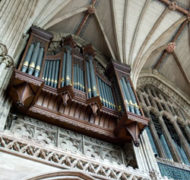Audience of One
Blog / Produced by The High Calling
I walk slowly toward the stone church in Leipzig, Germany, where Bach was choirmaster. For a lifetime, I’ve adored Bach. I push the heavy wooden door open, eager for a sight of the place where he composed his music. In the dark air, heavy organ notes waver and vibrate.
The church looks homey, practical, sturdy.
Bach saw himself not as a glittering artist, but as a craftsman. Generations of his family had been musicians. Orphaned at the age of 10, Bach taught himself music. He walked hundreds of miles to hear the best organists of his day. For most of his life, he composed a new piece every week to be performed on Sunday. At the beginning and end of each score, he wrote SDG. Soli Deo Gloria. To the glory of God alone. Bach never traveled outside of Germany. He published only about a dozen of his over 1,000 compositions. Much of his work has been lost.
It was Mendelssohn and others who brought fame to Bach, and then only after his death.
I walk around the church, wondering whether Bach ever felt discouraged. However brilliant he was, his fellow parishioners probably took him for granted. Week in and week out, Bach wrote anyway, his way of glorifying God. Sometimes it was a joy. Sometimes it probably felt like a sacrifice.
Our jobs? Cooking, designing, nurturing, constructing. But there’s no guarantee that what we do will be remembered, however brilliant it is—teaching a dyslexic child to read, washing windows, pitching a fabulous business proposal.
For us, as for Bach, it’s about glorifying God.
According to Genesis, God put Adam in the garden and told him to weed and cultivate. Some days that went well, Adam must have felt joy. Still, there was no one to clap for him or to remember what he had done—except his Creator. As Paul writes in Colossians 3:23, "Whatever you do, work at it with all your heart, as working for the Lord, not for human masters...."
SACRIFICE
Sometimes I think of Bach,
working a stick with his mouth
to get notes he couldn’t reach
with his hands and feet,
so the sweet catastrophe of counterpoint
could break the hearts of his parishioners.
And while we’re on the subject of music,
think of the monk who dove
and dove again into dark archives
to rescue from oblivion
the Gregorian chants of Leonin and Perotin,
whose names have lasted while his remained unknown,
though what they’ve dubbed him,
Anonymous IV, makes him less unknown
than other unknown writers.
Still, in the sacrifice business,
there’s no guarantee of fame.
Remember Annabel Lee Stein, whose brain
crawled backward (drawkcab)
through the little halls of words?
I bet no one can recall the teacher
who for years sat patiently coaxing
Annabel Lee to read. Sacrifice
can be slow as a funeral procession
in rush hour traffic, the sort of word
other words pass, honking.
And still, God (doG) is not
the only one who sacrificed,
as Annabel Lee could tell you,
Annabel, a grandmother now,
standing by the stove, moving her lips
as she reads a cake mix box.





